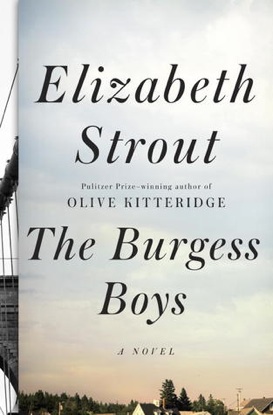
Elizabeth Strout’s latest novel “The Burgess Boys” follows up her 2009 Pulitzer Prize-winner “Olive Kitteridge,” which I liked quite a bit along with her novel “Amy and Isabelle” from 1998. So I jumped to read this one about two middle-age brothers, Bob and Jim, both lawyers in NYC, and their sister, Susan, who still lives in their hometown of Shirley Falls, Maine. “The Burgess” family reunites in Maine after Susan’s teenage son, Zach, pulls a senseless prank at a mosque that eventually leads to a hate-crime charge. Jim, who’s a hotshot corporate attorney,works to get the charge on his nephew dropped, while Bob, the hapless brother who’s always idolized Jim, goes to lend support to their sister Susan, who desperately needs their help.
“The Burgess Boys” is a bit of a departure for Strout, whose past books have mainly been about women and children, not brothers. This one seems a bit more accessible than quirky “Olive Kitteridge,” and is propelled by the topical issue of immigration and the prejudices surrounding the era after 9/11. But like her other books, “The Burgess Boys” focuses mainly on family relationships, which Strout writes so adeptly about, and involves New York and Maine, which might make you think Olive Kitteridge is going to pop out of the story briefly, but alas she doesn’t.
Strout writes masterfully about the Burgess siblings and I got drawn in to the Jim-Bob-Susan dynamic of the story along with their spouses and exes. There’s a hierarchy, disfunctionality and grievances towards one another that feels very real, all shaped by the guilt of their father’s accidental death when they were young. Towards the end of the book, a secret about this is revealed that blows the story into another gear.
“The Burgess Boys” is a book that’s both subtle yet charged. I’m sure I especially won’t forget about Bob or Jim for a while. They conjure a complexity about brothers that seems to hit a nail on the head. With “The Burgess Boys,” I felt for a time like I had stepped into a siblings’ world and how they had grown up in Maine with the weight of their childhood on their shoulders. Perhaps because of this they seem to hang on to each other despite their troubled relations, and the book is more touching than a downer.
It might be a departure from “Olive,” but “The Burgess Boys” is a solid follow-up.

I’m glad to see this is more accessible than Olive Kitteridge which totally intimidates me.
Yeah Kathy I think you’d like this one better than “Olive.”
I haven’t yet read this author, but I love books about family relationships. This is one I plan to read.
Here’s MY SUNDAY SALON POST
Yeah Laurel — I think you might like this one. Thanks. I’ll stop by your post. cheers
I never got to Olive Kitteridge. I had it reserved at the library and somehow missed the call that it was available. Then I didn’t pursue it again. I need to catch up. Burgess Boys sounds good too.
Yeah this book seems more accessible than Olive. Olive was interesting but dark or sad; empty-ish feeling.
I am actually thinking about saving it for audio. Do you think it will translate well?
Yes. I think it would be good on audio. … depending on the actor who reads it, but it should be good.
I didn’t realize Strout has a new book out. Off now to ad it to my wishlist. Thank you!
Yep … Strout’s books are always worth getting. Check it out.
Such a nice review. You are probably right; this one might be a book more people connect to than OK. Still, I liked OK better. I prefer stories with women as characters. Woman are more human than men, somehow.
Thanks Deb. Yeah Olive was definitely something else!